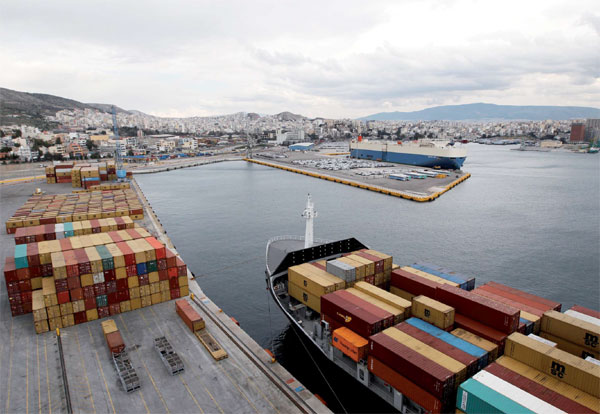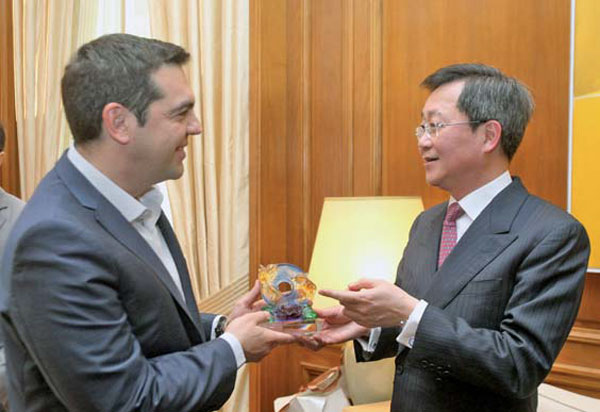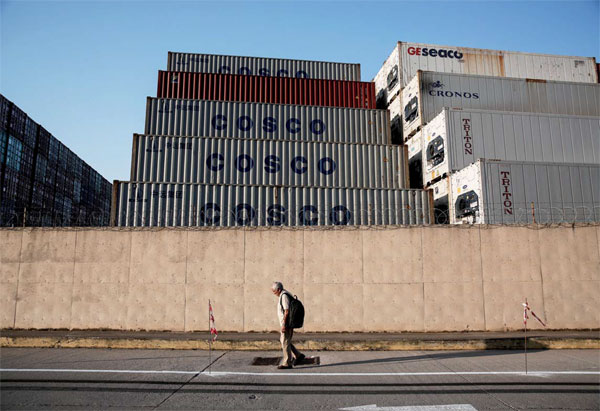Passage to piraeus
Updated: 2016-04-15 08:52
By Maria Petrakis in Athens and Lyu Chang in Beijing(China Daily Europe)
|
|||||||||
Cosco navigates witches, dragons and heroes to harness ancient Greek port and link it to Belt and Road Initiative
On a sunny Friday in the Greek capital, politicians, shipowners, bankers and diplomats were celebrating the sale of Piraeus Port, the nation's ancient harbor, to another ancient nation, China.
Xu Lirong, chairman of China Cosco Shipping Corporation Limited, known as Cosco, extolled the benefits of the deal he had just signed with Greek Prime Minister Alexis Tsipras in a 19-century exhibition hall and, referring to one of the most ancient Greek tales, says Piraeus can recover the Golden Fleece.
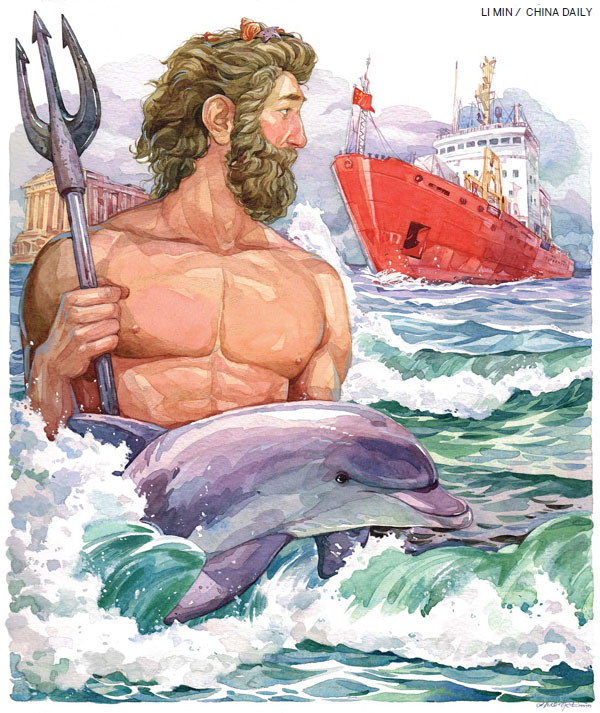
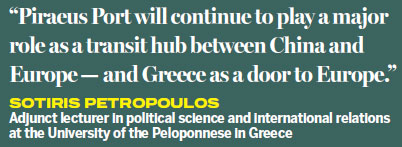
|
An aerial view of a container and car terminal in the port of Piraeus in Greece. John Kolesidis / Reuters |
|
Greek Prime Minister Alexis Tsipras (left) meets with Cosco Chairman Xu Lirong during the signing ceremony for the sale of a majority stake in Piraeus Port in Greece on April 8. Xinhua Photo |
Getting to this day, April 8, may have seemed to the Chinese a journey as fraught with peril and danger as in the ancient tale of Jason and the Argonauts, where the hero Jason dodges dragons whose teeth sow warriors and marries a sorceress to reclaim the Golden Fleece and his birthright, a throne.
But for the Chinese, Piraeus is more of a dragon's head - an emblem of power and leadership - than a dragon's tooth. Buying a majority stake in Piraeus Port, which the Chinese have already made one of the fastest-growing harbors in the world, ensures control over a key thoroughfare in the plan to recreate a commercial empire pumping Chinese goods throughout the continent, as well as trade heading for China.
For Cosco, Piraeus is the point at which China nudges into Europe as part of President Xi Jinping's vision of the Belt and Road Initiative, a modern-day Silk Road, as China's gateway to Europe.
Since the Chinese shipping behemoth agreed to take over container operations at two piers in Piraeus in 2008, traffic has surged at Greece's biggest harbor.
Piraeus, Xu says, will become the Mediterranean's largest container transit port, the international logistics distribution center of the eastern Mediterranean, and the southern gate of Central and Eastern Europe, and the Balkans.
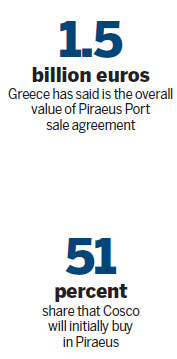
Chinese money will be invested to restore ship repair facilities, boost jobs and provide key support to the booming cruise terminal business.
Greece has said the overall value of the agreement is about 1.5 billion euros ($1.71 billion), including investments, dividends and income from an existing concession agreement. Cosco will initially buy a 51 percent stake in Piraeus for 280.5 million euros and the additional stake in the next five years for 88 million euros after further investments.
That is already the Golden Fleece for Greece, says Sotiris Petropoulos, adjunct lecturer in political science and international relations at the University of the Peloponnese in Greece. Becoming a transit hub for EU-East Asia trade will help put the country back on the path to sustainable development and free it from public debt.
"Cosco, one of the largest container shippers and handlers in the world, will now be even more involved in the Greek transport networks," he says. "Piraeus Port will continue to play a major role as a transit hub between China and Europe - and Greece as a door to Europe."
Piraeus' relatively short distance from the main Mediterranean maritime route allows it to act as both a transshipment hub and gateway, according to a 2012 report by consultants McKinsey & Co, which said the country could transform itself into a regional cargo and logistics center as part of a 10-year plan.
There is serious Chinese interest in a plan to build a major freight and logistics center on the Thriasio plain, an expanse that's been described as the industrial backyard of Athens.
A major new airport planned for Crete would give the Chinese an additional foothold in the Mediterranean.Cosco is also thought to be among the suitors to purchase Greece's train operator, Trainose.
The Athens-based Foundation for Economic and Industrial Research estimated in March that the deal would add 0.8 percentage point to GDP growth by the end of 2025, create more than 31,000 jobs - in a nation with the EU's highest unemployment - and reduce public debt by 2.3 percentage points of GDP. It could draw 867 million euros in investments from other companies in the next 10 years.
"Greece eventually could become one of the major hubs of the Belt and Road Initiative, and if investments in logistics and infrastructure are complemented by a stable macroeconomic environment and regulatory predictability, it can attract many more investments in other sectors as well," says Vassilis Trigkas, a research fellow at the Center for China-EU Relations at Tsinghua University. "With Piraeus, China has acquired a very strategic port."
The deal, the first overseas investment after Cosco emerged from the merger of two major Chinese shipping companies in December last year, was followed by a slight surge in shares of China Cosco Holdings Co, a subsidiary, that witnessed a 2.13 percent increase to 6.24 yuan ($0.96; 0.84 euros) on April 11.
Zhou Mi, a senior research fellow at the Chinese Academy of International Trade and Economic Cooperation, says the move would not only boost regional connectivity and cooperation between China and Europe, but also provide better services to Chinese companies.
"After gaining the majority stake in the port, I think that it will also help Cosco design customized services and better manage in terms of containers, routes and timetables to better serve the Chinese clients," he says.
Tu Xinquan, director of the China Institute for WTO Studies at the University of International Business and Economics, says the agreement is a win-win situation for both countries.
"The port is of strategic importance for China and helps boost ties and trade between the two regions. But debt-laden Greece still needs the investment to boost its economy and generate local employment," he says.
The deal will be even more important for the countries in Central and Eastern Europe from the trade perspective, Tu adds.
"Those countries are banking on the Belt and Road Initiative to expand exports of agricultural products and other commercial goods to China, their major trade partner."
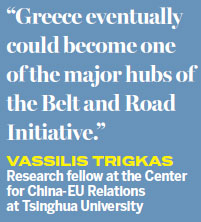
The acquisition was not done in a day, Tu points out, adding that the Chinese company been operating at the port for many years.
"The Chinese company is very experienced in terms of port management," he says. "I think after the transaction it will reduce the cost of transportation and trade."
The deal has been no small feat. On the day of the signing, apart from protesting dock workers in Athens, who scuffled with police, there were thousands of refugees from Syria, Afghanistan and Iraq camped on one of the piers of Piraeus Port, testimony to the geographical advantages of Greece that drew Cosco to Piraeus in the first place. Tsipras, whose election platform in January had initially included plans to put a brake on state asset sales such as Piraeus Port, is set to visit Beijing in June, in line with the new Greek foreign policy imperative of wooing China, prompted by important links between Greek shipowners - who still own one of the world's biggest fleets - and China, Petropoulos at the University of the Peloponnese says.
In the months before Cosco won the 2008 deal to operate two piers in Piraeus, Greek officials such as then- president Karolos Papoulias underlined that 60 percent of Chinese maritime import trade was conducted by Greek-owned cargo ships and that Chinese shipyards were planning to build a large number of Greek vessels.
Agence France-Presse reported in June 2014 that Chinese shipyards had received orders to construct 190 vessels for Greek owners.
"The links played a crucial role in mobilizing the Greek state to 'discover' China, which was developing exports and building on a mutually beneficial scenario of Greece being a door to Europe," says Petropoulos, who wrote a paper on the foreign policy shift with his colleague, Asteris Huliaras, in 2013.
Greece aimed to conquer markets in Balkan countries before its debt problems caused an undignified retreat, primarily of its banks, from the region. But Tsinghua University's Trigkas says an often overlooked aspect of the Piraeus Port deal and accompanying infrastructure investments is the impact on regional integration.
The Hungary-Serbia Railway to connect Budapest with Belgrade is due to be completed in 2017. The bullet train, together with Piraeus, will be the European part of the China-Europe land-sea express route, consolidating Greece as a transportation hub, linking the 21st Century Maritime Silk Road with the Silk Road Economic Belt on land.
Economic integration between Central and Eastern Europe will unleash enormous economies of scale for European industry, Trigkas says. The recovery of the Mediterranean region and the economic integration between Africa and Southern Europe will provide enormous positive externalities for Northern Europe as well. In the overarching Silk Road project for the Mediterranean, Greece could play a catalytic role, Trigkas says.
"For the first time in history, the Balkans are being integrated economically to a great extent," he says. "China persisted with the port agreement even though demagogy from the Greek political class had been out of proportion. It is important for Greece at this moment to seize the opportunity."
For Greece, forced into humiliating negotiations with EU and global financial institutions for bailouts to resolve its debt crisis, the Cosco deal and its attendant Chinese interest have come as a shot in the arm.
The Piraeus deal is being seen as a catalyst in the so far lackluster sale of Greek state assets, as demanded by its creditors, the European Union and the International Monetary Fund, in return for bailouts.
For China Daily
|
Cosco containers at the pier in the commercial shipping area of Piraeus Port. Provided to China Daily |
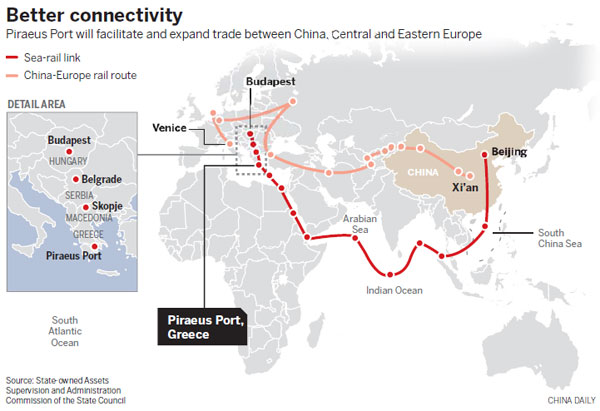
( China Daily European Weekly 04/15/2016 page1)
Today's Top News
World Bank joins AIIB on financing for joint projects
GM seeds to get oversight
Russia-China ties benefit both countries, peoples
China, UK showcase best books in London
Hello, China! Stephen Hawking debuts Weibo account
Manila set to restart revamp of airport in S China Sea
Forget cabs, now you can book plane through apps
Britain and China must join to solve steel crisis, ambassador says
Hot Topics
Lunar probe , China growth forecasts, Emission rules get tougher, China seen through 'colored lens', International board,
Editor's Picks

|

|

|
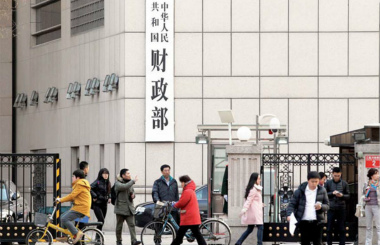
|

|

|
